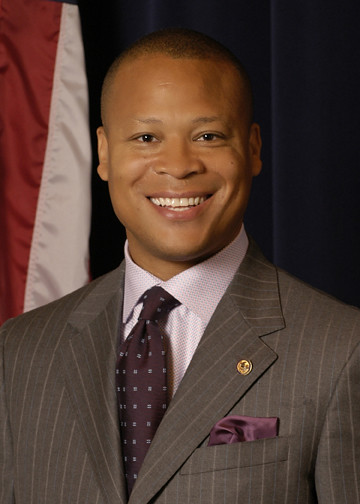Once again, traffic enforcement cameras are being used as a political football in Chicago. Last November, 12th Ward Alderman George Cardenas showed he’s more interested in votes than reducing crashes and fatalities, when he led a protest against speed cameras on the 3200 block of South Archer in McKinley Park neighborhood, near the Mulberry Park green space.
Cardenas called the speed cams an “aggressive tactic to nickel and dime the taxpayers,” disregarding the fact that the eighth-mile safety zone around the park was in the top ten percent of Chicago safety zones for crashes. Between 2009 and 2012, there were 214 crashes near the park, six of them resulting in serious injuries or deaths.
Now state representative Ken Dunkin is getting in on the cam-bashing act. Dunkin, a Democrat whose represents the 5th District, mostly located on Chicago’s South Side, faces a tough reelection battle in next month’s primary because he broke ranks with his party in a key vote last November.
He sided with Republican governor Bruce Rauner by abstaining from a vote on a bill that would have reversed deep cuts Rauner made to state childcare programs, a move which effectively killed the legislation. As a reward to Dunkin for helping out the governor, a political action committee with ties to Rauner recently made a $500,000 donation to the rep’s campaign fund.
In an apparent attempt to shore up needed political support, Dunkin is calling for a statewide ban on red light and speed cameras. On Sunday, he held a press conference with dozens of members from Citizens to Abolish Red Light Cameras, the same group that showed up for Cardenas’ anti-cam grandstanding event. The presser took place near a red light cam at 76th Street and Stony Island Avenue
Dunkin said he wants House Speaker Mike Madigan to allow lawmakers to vote on House Bill 141, legislation to ban red light and speed cameras, which has been stuck in the Rules Committee since spring 2015. Dunkin argued that the cams are in place to create revenue but don’t improve safety, which allows taxpayers to be “gouged and to be played by the scam of the century,” the Sun-Times reported.
Dunkin pointed to last week’s conviction of Richard M. Daley-era transportation official John Bills for taking bribes from former red light camera Redflex as proof that the city’s traffic cam initiative is inherently corrupt. During his 2015 reelection campaign current mayor Rahm Emanuel announced a number of reforms to the red light camera program, including the removal of 50 red light cameras at 25 intersections that saw one or fewer right-angle crashes in 2013.
What Dunkin is choosing to ignore is that, despite the Daley-era corruption, there’s plentiful evidence from cities around the country and that well run automated enforcement programs save lives. A 2010 review of 28 studies of speed camera programs found uniformly positive effects on motorist speed and fatality rates.
And a 2011 study by the Insurance Institute for Highway Safety comparing cities with red light cameras to those without found that in the 14 largest U.S. cities, the cams decreased the number of deadly red-light-running crashes by 24 percent.
There’s also evidence that automated enforcement is working in Chicago. A preliminary analysis by the Chicago Department of Transportation found that crashes with injuries dropped by 4 percent citywide between 2012—the year before the first speed cams were installed—and 2014. However, injury crashes dropped 18 percent within the 21 safety zones where speed cams were installed in 2013. Severe and fatal crashes went down a full 22 percent.
Even 5th Ward alderman Leslie Hairston, who has not been particularly receptive to safe streets initiatives, told me last month she believes that the red light camera at 76th and Stony, where Dunkin held his press conference, is doing its job to help discourage dangerous driving.

“There’s no [legislative] member in his right mind who would not support this legislation [to ban traffic cameras],” Dunkin said at his event, according to the Sun-Times. So what would happen if lawmakers in Springfield did vote to abolish the cams?
Judging from the way things played out in Houston, Texas, the result would be significantly more crashes, serious injuries, and deaths. After voters in that city banned red light cameras in 2010, the number of collisions at intersections that formerly had the cams more than doubled, and the number of fatal crashes went up by 30 percent, according to the local police department.
Dunkin callously chose to block childcare funding legislation in order to score points with the governor. It’s not surprising that he’s being equally cynical about pushing for legislation that would win votes by making our streets more dangerous.






